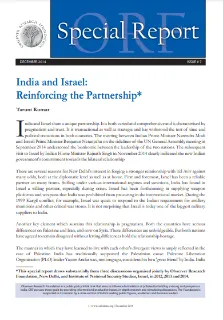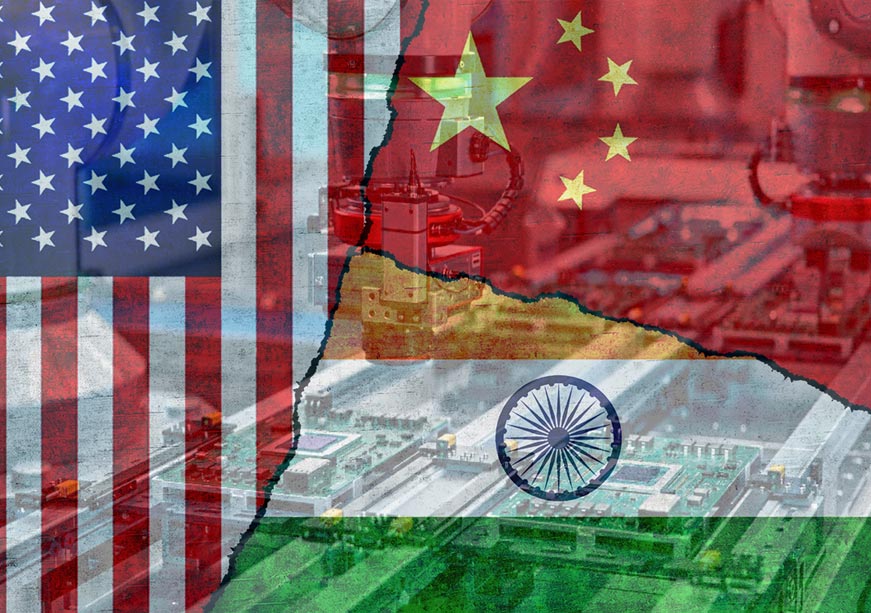India and Israel share a unique partnership. It is both varied and comprehensive and is characterised by pragmatism and trust. This Special Report analyses the relationship and the potential for greater cooperation between the two countries.
India and Israel share a unique partnership. It is both varied and comprehensive and is characterised by pragmatism and trust. It is transactional as well as strategic and has withstood the test of time and political transitions in both countries. The meeting between Indian Prime Minister Narendra Modi and Israeli Prime Minister Benjamin Netanyahu on the sidelines of the UN General Assembly meeting in September 2014 underscored the bonhomie between the leadership of the two nations. The subsequent visit to Israel by Indian Home Minister Rajnath Singh in November 2014 clearly indicated the new Indian government’s commitment towards the bilateral relationship.
There are several reasons for New Delhi’s interest in forging a stronger relationship with Tel Aviv against many odds, both at the diplomatic level as well as at home. First and foremost, Israel has been a reliable partner on many fronts. Stifling under various international regimes and sanctions, India has found in Israel a willing partner, especially during crises. Israel has been forthcoming in supplying weapon platforms and weapons that India was prohibited from procuring in the international market. During the 1999 Kargil conflict, for example, Israel was quick to respond to the Indian requirement for artillery munitions and other critical war stores. It is not surprising that Israel is today one of the biggest military suppliers to India.
Another key element which sustains this relationship is pragmatism. Both the countries have serious differences on Palestine and Iran, and now on Syria. These differences are unbridgeable. But both nations have agreed to remain disagreed without letting differences hold the relationship hostage.
The manner in which they have learned to live with each other’s divergent views is amply reflected in the case of Palestine. India has traditionally supported the Palestinian cause. Palestine Liberation Organisation (PLO) leader Yasser Arafat was, not long ago, considered to be a ‘great friend’ by India. India was the first non-Arab state to recognise PLO as the official representative of the Palestinian people in 1974. It was much later in 1992 that India established a diplomatic relationship with Israel.
Although there has not been any significant change in India’s stand on the Palestine issue, its relationship with Israel has flourished to an extent that it has overshadowed India’s previous attempts to champion the Palestine cause. Some analysts believe that this marked change is a result of the lack of returns from India’s pro-Arab policy. Proximity to Arab states was aimed at creating leverage over Pakistan. But with Arab states making no attempts to shore up India’s position on Kashmir and terrorism sponsored by Pakistan, there was a sense of disillusionment in New Delhi. The Palestine cause was also viewed in the political circles in India as being ‘sensitive’ to the Muslim community. But it was a misplaced belief, since much of the Muslim anxiety was about empowerment and justice. India, however, has not abandoned its traditional support for Palestine but has kept it distinct from its relationship with Israel.
An example of this was seen soon after Israel launched Operation Protective Edge in July 2014. In a public statement, India expressed concern over the “tragic loss of civilian lives” in Gaza, but added that the “cross-border provocations result[ed] from rocket attacks” on Israel. The mention of cross-border provocations is reminiscent of the cease-fire violations that take place on the Indo-Pakistan border with alarming regularity. India seems to draw a parallel between Israel’s struggle with Hamas and its own struggle against cross-border terrorism from Pakistan.
In many ways, terrorism has brought the two countries together in recent times. There is much in common in the nature of threats both countries face. Both India and Israel are isolated by widening circles of uncertainty in their immediate neighbourhood. Both are victims of terrorism, from global jihadi groups as well as state-sponsored terrorist proxies. India and Israel remain, besides the US, the prime targets of almost all terrorist groups operating in the world today. Democracy has given both countries a sense of stability, unlike most of their immediate neighbours.
Besides a common democratic heritage, India is drawn to Israel’s power of innovation. Israel has made remarkable progress for a country of its size and location in emerging as one of the important manufacturing hubs for specialised weapons and weapon components. It has developed excellent electronic warfare systems, aviation electronics and is home to some of the best military software firms in the world. Its military R&D is on par with far bigger and powerful countries. India has benefited noticeably from Israel’s military hardware superiority, and more important, its willingness to supply hitech armoury and weapons systems that other countries are reluctant to sell or sell with severely restrictive clauses.
Likewise, Israel’s progress in achieving remarkable breakthroughs in water management and innovative farming practices make the relationship even more critical for India, which today faces major water and farm crises.
India clearly has much to gain from a strengthened bilateral relationship. But so has Israel—in terms of political recognition, a bourgeoning market and a relationship with an emerging economic power that is a maritime nation with a stake in the world’s most critical shipping lines in the Indian Ocean. This is apart from an overwhelming goodwill among the people of the second most populous country in the world. Israel is also one of the very few countries which has a notable support in different political quarters in India.
The above cited factors have given the relationship a strong foundation to build an even more robust, all weather partnership, encompassing agriculture technologies to cyber security. Both nations, islands of stability in turbulent regions, could learn, support and shore each other up in facing the ever-growing challenges to their people and future.
This special report takes a closer look at some to intelligence sharing of the issues enumerated above with the objective of identifying areas where the relationship could be enhanced. The first section examines cooperation between India and Israel across a wide swath of domestic issues ranging from defence and science to trade and agriculture. The second section looks at cooperation on foreign policy issues.

 PDF Download
PDF Download



 PREV
PREV

